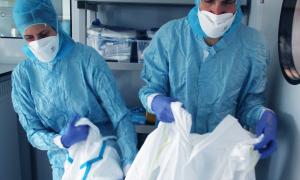Pre-clinical studies confirm that the CPC component of some mouthwashes reduces the infectivity of SARS-CoV-2

IrsiCaixa researchers, in collaboration with Dentaid Research Center, state that cetylpyridinium chloride (CPC), a chemical component present in some mouthwashes, is capable of reducing about 1000 times the infection capacity of SARS-CoV-2 in studies carried out on cell cultures in the laboratory.
Mouthwashes have come under the spotlight of the scientific community because of their antiseptic capacity, as they could be a useful tool to stop the transmission of SARS-CoV-2. Now, researchers from the PISTA group at IrsiCaixa, a centre promoted jointly by the "la Caixa" Foundation and the Department of Health of the Generalitat de Catalunya, in collaboration with scientists from the Dentaid Research Center, have discovered that cetylpyridine chloride (CPC), a chemical component present in some mouthwashes, has an anti-viral effect; specifically, it is capable of reducing up to 1000 times the infection capacity of SARS-CoV-2 in an experiment carried out on cells cultivated in the laboratory. So far, the antiviral effect has been proved in these pre-clinical studies, so the next step will be to do so in a human efficacy trial, which will be led by the Fight AIDS and Infectious Diseases Foundation (FLS). Showing the antiviral effect of CPC in humans will be key to helping reduce the transmission of SARS-CoV-2 in any geographic area, as the mouthwashes are affordable, easily distributed and storable.
"The results we have obtained are encouraging. The fact that a mouthwash with CPC is capable of reducing so much the capacity of SARS-CoV-2 to infect is very good news, as we would be able to stop the rapid transmission of the virus among people, which is what worries us the most right now", celebrates the director of IrsiCaixa, Bonaventura Clotet.
Destabilizing the virus
The membrane is an essential element for viruses to recognise and infect cells. It contains essential molecules, such as the spike protein (S-protein) in the case of SARS-CoV-2. In this pre-clinical study, it has been shown that the membrane is destabilised on contact with CPC, so that the S protein is no longer functional and SARS-CoV-2 is unable to infect.
To show that the virus is not infectious under these conditions, researchers have exposed, for two minutes, viruses isolated from patients with COVID-19, to the mouthwash containing CPC. Thus, they have been able to observe that the infection capacity of SARS-CoV-2 after contact with the mouthwash is reduced up to 1000 times in cell cultures. "We have proven that CPC really does have an antiviral role because, by carrying out the same experiment with mouthwash without CPC, the virus still has a high capacity to infect and destroy cells" states the study coordinator and principal researcher at IrsiCaixa, Nuria Izquierdo-Useros. " If we bear in mind that in the experiment we have used a higher amount of virus than that found in the oral cavity of infected people, and a lower amount of mouthwash than people usually use, these results are very encouraging", points out the researcher.
A useful tool for slowing down the transmission
Today, ending the COVID-19 pandemic is the main goal at a global level. "The oral cavity plays a crucial role in the transmission of SARS-CoV-2. Viruses are present in saliva and, although there is still a long way to go, the mouthwashes we are working on could be a potential transmission prevention tool," says Joan Gispert, Director of R&D at DENTAID.
The efficacy trials to be carried out soon with the support of FLS are aimed at confirming the initial results obtained in a pilot study carried out in Colombia, focused on studying the amount of infectious virus in people with COVID-19 before and after the application of the mouthwash. "We want to confirm that the antiviral effect we see in the laboratory can be extrapolated to humans and study how long this effect lasts. Although the use of this mouthwash does not prevent SARS-CoV-2 infection, it could prevent the spread of the virus," points out Izquierdo-Useros. "This would be easy, effective and globally applicable," she concludes.